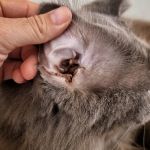
- 1-Understanding Gut Microbiome and Its Importance
- 2-The Connection Between Gut Microbiome and Pet Mental Health
- 3-How Gut Health Affects Pet Behavior
- 4-Improving Pet Mental Health Through Gut Health
- 5-Choosing the Right Diet for Your Pet's Gut Health
1. Understanding Gut Microbiome and Its Importance
The gut microbiome refers to the vast community of bacteria, fungi, viruses, and other microorganisms that reside in the digestive tract. These tiny organisms play a crucial role in maintaining overall health, including digestion, immune function, and even mental health. Although we often associate the gut with digestion, emerging research suggests that the health of your pet’s gut microbiome could significantly affect their mood, behavior, and even cognitive function.
For years, researchers have studied the gut-brain axis, a communication pathway between the gut and the brain. What’s fascinating is that the microbiome can influence the brain through this connection, potentially affecting your pet’s mental health in profound ways. Understanding this link is the first step in improving your pet's overall well-being.
2. The Connection Between Gut Microbiome and Pet Mental Health
Recent studies have highlighted the important role that the gut microbiome plays in regulating mood and mental health in pets. Just as in humans, the balance of bacteria in your pet’s gut can influence their behavior, emotions, and even susceptibility to stress and anxiety. When the gut microbiome is imbalanced, it can lead to an array of behavioral issues, including anxiety, aggression, and even depression in pets.
For example, pets with gastrointestinal issues, such as chronic diarrhea or an upset stomach, often display behavioral changes such as restlessness, irritability, or even depression. This could be due to an imbalance in their gut microbiome. On the other hand, a healthy gut with a balanced microbiome is more likely to contribute to a pet’s calm demeanor and emotional stability.
Veterinarians are now considering gut health as an integral part of treating pets with behavioral problems. By restoring balance in the gut microbiome, it’s possible to improve a pet’s mental health, reduce stress, and even alleviate anxiety-related behaviors.

Equine Services, PSC
SimpsonvilleShelby CountyKentucky
9460 Shelbyville Rd, Simpsonville, KY 40067, USA
3. How Gut Health Affects Pet Behavior
Several behavioral disorders in pets, including anxiety, aggression, and compulsive behaviors, may be linked to an unhealthy gut microbiome. When pets experience stress, their gut bacteria can be affected, leading to an imbalance that can further exacerbate these behavioral issues.
For example, a study in dogs showed that those with gastrointestinal disorders were more likely to display signs of anxiety. The connection seems to be that an imbalance in gut bacteria triggers an immune response that affects brain function. Pets with a disrupted microbiome may experience changes in their mood, manifesting as lethargy, irritability, or even signs of depression.
Furthermore, the gut microbiome has been shown to affect serotonin levels, a neurotransmitter that plays a key role in regulating mood and emotional responses. As much as 90% of serotonin is produced in the gut, so a disruption in the microbiome can lead to decreased serotonin levels, potentially making your pet more prone to anxiety or mood swings.
4. Improving Pet Mental Health Through Gut Health
Improving the gut microbiome can be a powerful tool in enhancing your pet’s mental health. Here are several ways you can support your pet’s gut health to promote better behavior and emotional well-being:
1. Probiotics for Pets
Probiotics are beneficial bacteria that help maintain a healthy gut. Adding probiotics to your pet’s diet can support their digestive system and help restore balance in the microbiome. Many pet owners are now incorporating pet-specific probiotics to improve their pets’ gut health, which can, in turn, improve their mental health and mood stability.
2. Prebiotics and Fiber
Prebiotics are compounds that promote the growth of beneficial bacteria in the gut. Foods rich in fiber, such as pumpkin or sweet potato, can act as prebiotics, feeding good bacteria and encouraging a healthy gut microbiome. A balanced diet rich in prebiotics and fiber helps support both your pet's digestive and mental health.
3. Reducing Stress and Anxiety
Stress management is also crucial for improving your pet’s gut health. Pets under constant stress may experience changes in their gut microbiome, which can exacerbate mental health problems. Providing a calm environment, regular exercise, and mental stimulation are key components of managing stress for your pet.
5. Choosing the Right Diet for Your Pet's Gut Health
A balanced and nutritious diet is the foundation of good gut health. High-quality pet foods that are rich in fiber, omega-3 fatty acids, and probiotics can help support a healthy gut microbiome. When choosing a diet for your pet, consider the following:
1. Grain-Free vs. Grain-Inclusive Diets
Some pets may have sensitivities to grains, leading to digestive issues. In these cases, a grain-free diet may be beneficial. However, not all pets require grain-free food, so it’s essential to tailor your pet’s diet to their individual needs.
2. High-Quality Proteins
Proteins from quality animal sources, such as chicken, lamb, or fish, provide the amino acids necessary for optimal health. These proteins are essential for maintaining healthy gut bacteria and supporting overall health, including brain function.
3. Omega-3 Fatty Acids
Omega-3 fatty acids, found in fish oils and certain plant oils, have anti-inflammatory properties and support cognitive function. They can help protect against stress-induced gut imbalances and promote a healthy mind.
By providing the right nutrition, supplements, and stress management strategies, you can help support your pet’s gut health, leading to better overall well-being and improved mental health.
To support your pet’s gut and mental health, visit [Pet & Puppy] for expert recommendations on pet foods, supplements, and more!








 Yates Benjamin a DVM5.0 (4 reviews)
Yates Benjamin a DVM5.0 (4 reviews) Goose Creek Animal Clinic: Watson Ray DVM5.0 (4 reviews)
Goose Creek Animal Clinic: Watson Ray DVM5.0 (4 reviews) Chewy Vet Care Chandler0.0 (0 reviews)
Chewy Vet Care Chandler0.0 (0 reviews) Franklin Falls Animal Clinic4.0 (38 reviews)
Franklin Falls Animal Clinic4.0 (38 reviews) Foree JB DVM4.0 (50 reviews)
Foree JB DVM4.0 (50 reviews) Central Phoenix Animal Hospital4.0 (236 reviews)
Central Phoenix Animal Hospital4.0 (236 reviews) When Is It Time for Pet Physical Therapy or Rehab?
When Is It Time for Pet Physical Therapy or Rehab? How Smart Litter Boxes Help Monitor Cat Health
How Smart Litter Boxes Help Monitor Cat Health Remote Monitoring of Chronic Illness in Pets: A New Era in Pet Healthcare
Remote Monitoring of Chronic Illness in Pets: A New Era in Pet Healthcare Heatstroke Prevention: How to Keep Pets Cool in Summer
Heatstroke Prevention: How to Keep Pets Cool in Summer How to Detect & Manage Pet Ear Tumors
How to Detect & Manage Pet Ear Tumors Recognizing Pet Anxiety: Behavioral & Physiological Cues Every Pet Owner Should Know
Recognizing Pet Anxiety: Behavioral & Physiological Cues Every Pet Owner Should Know